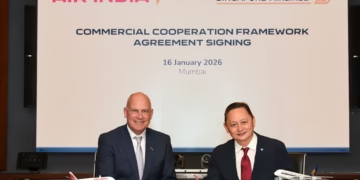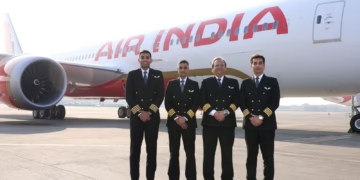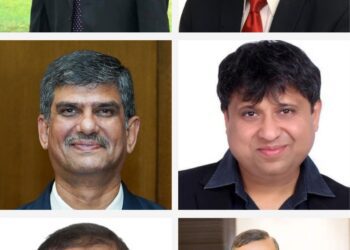The hospitality and tourism sector were largely in favour of the GST rates being lowered for rooms priced under Rs 7,500. Experts in the field predict that the action will increase domestic travel, lower the cost of stays, and increase reservations for the next holiday and celebration season. This recent development has received strong and more vibrant reaction from the industry players.
Hospitality and tourism sector’s reaction
Neha Kapoor, General Manager, Hyatt Place Gurgaon

We welcome the government’s decision to slash the GST rate to 5% on room tariffs up to ₹7,500. It makes quality hotel stays more affordable and accessible to a wider base of travellers while adding real value to their experience. We anticipate this change will translate into stronger demand and improved occupancy levels. Beyond the immediate benefits, it also paves the way for healthier growth in the hospitality sector, supports tourism, and strengthens the industry’s contribution to the economy.
Sarbendra Sarkar, Founder & MD, Cygnett Hotels and Resorts

The GST overhaul marks a turning point for India’s hospitality sector. By reducing GST on hotel stays under ₹7,500 to 5%, the government has effectively democratised travel. This will boost domestic tourism, encourage corporate travel to tier-2 and tier-3 cities, and improve occupancy for mid-scale hotels, which form the backbone of our industry. However, luxury hotels remain at 18%, which keeps India aligned with global practices, where premium stays are taxed at a higher rate. The challenge will be balancing this benefit with the loss of input tax credit (ITC), which could compress margins for some operators. Overall, the move signals a clear policy direction, making travel more affordable and inclusive, while still protecting the exclusivity of luxury experiences.
Sumit Mitruka, CEO and founder, Summit Hotels & Resorts

The reforms announced at the 56th GST Council are far more than a matter of taxation; they represent a structural reset in the way India approaches housing, travel, and consumption. By placing mid-scale hotel accommodation within the 5% bracket, the government has significantly broadened affordability in domestic tourism, ensuring that demand in emerging destinations can flourish. At the same time, the simplification of GST for residential real estate, through reduced construction costs and clearer slab structures, is poised to stimulate housing supply and bolster confidence, particularly across tier-II and tier-III cities.
Perkin Rocha, Founder & CEO, ECKO Hotels & Resorts

We at Ecko Hotels & Resorts applaud the GST Council’s move to reduce the tax rate on hotel rooms priced up to ₹7,500 per night from 12% (with input tax credit) to 5% (without ITC), effective September 22. This timely reform is poised to make quality accommodations more accessible to India’s growing domestic traveler base, particularly as we enter the festive and wedding season. While the removal of input tax credit presents operational challenges for hoteliers, this rationalization is an important step toward stimulating demand, boosting occupancy, and reinforcing the vital role of the mid-market segment in India’s tourism growth story.
Mahesh Iyer – Managing Director and Chief Executive Officer, Thomas Cook (India) Limited

At the Thomas Cook India Group, we welcome the Government’s simplification of the GST structure across sectors — from daily essentials and healthcare to education, electronics, automobiles as well as travel and hospitality. The elimination of the 12% slab and the lowering of several categories to the 5% bracket, marks a decisive shift towards boosting affordability and driving increased consumption. Additionally, the earlier income tax exemption for income up to Rs. 12 lakhs, coupled with this GST reduction, is expected to result in higher disposable income. For the travel and tourism industry, this is a very positive development across B2C & B2B segments. With hotel tariffs up to ₹7,500 per down to 5% from 12%, the domestic travel and tourism sector especially in the mid and upper-mid market stands to benefit significantly. Additionally, retaining economy airfares at the lower 5% slab, ensures that travel remains accessible. The reform thus delivers a two-pronged impact: directly, through lower GST rates on travel-related services, and indirectly, by enhancing consumer purchasing power via reduced rates across several consumption sectors – at a strategically opportune time, just ahead of the festive season.
Dr. Sanjay Sethi, MD & CEO, Chalet Hotels Limited

The recent GST announcements are progressive and in line with the larger vision of nation building and sabka vikas. They will undoubtedly provide a positive impetus to the Indian economy. A big positive for Chalet and the hotel industry in general. Placing room tariffs below Rs 7,500 in the 5% GST slab is a welcome step. At the same time, it is important to address a key concern for the smaller and budget hotels. Simultaneous withdrawal of Input Tax Credit (ITC) creates an unintended anomaly.
Sandeep Arora, Director, Brightsun Travel, India

We welcome the government’s decision to reduce the GST rates from 12% to 5% on budget hotels and economy flights, a relief to both travel industry and the consumer. This move will make travel more affordable and accessible to a large number of Indian travellers, boosting the domestic travel and encouraging more people to explore different destinations. We are excited to help customers take advantage of these savings and plan memorable trips without breaking the bank.
Sudeep Jain, Managing Director, South West Asia, IHG Hotels & Resorts

The GST Council’s decision is a progressive step that will positively impact India’s hospitality industry. By easing the tax obligations on guests with room rates below ₹7,500, the government has created a more supportive environment not just for mid market and budget hotels in metros, which play a significant role in India’s travel growth story, but also for hotels beyond the metro cities. This rationalisation will make quality hospitality more accessible to domestic travellers, further boost tourism demand, and reinforce India’s position as one of the world’s most dynamic hospitality markets.
Vibhas Prasad, Director, Leisure Hotels Group


Sandeep Khetarpal, Founder of ZoTrav and ZoRoam

We congratulate the government on the September 4 GST reforms, a timely and progressive boost for the travel sector. By reducing rates on hotels, flights, and essential industries linked to everyday needs, these measures make travel more accessible and inspire greater spending on experiences and value-adds. At ZoTrav, we view this as a catalyst for sustainable growth and innovation across the travel ecosystem.

We wholeheartedly welcome the government’s decision to reduce GST on hotel rooms priced up to ₹7,500. This progressive move is a win-win for both guests and the hospitality sector. By lowering the GST rate from 12% to 5%, we expect a notable increase in occupancy levels, making quality stays more accessible to a wider audience. This step is anticipated to drive a growth of around 7% –10% in revenues, empowering us to reinvest in elevating our services, upgrading facilities, and delivering an even more exceptional guest experience.
Sanat Hooja, Partner, Machan Resorts LLP.

The GST Council’s decision to reduce GST on hotel rooms priced up to ₹7,500 from 12% to 5%—effective September 22—is a welcome step, especially for budget and mid-market hotels. This change, coming after eight years, is expected to boost revenues in that segment by 7 to 10 percent.
At our Rajasthan property, The Legacy by Machan, this move will bring positive traction during the off-season, making it more affordable for domestic travelers. However, for most leisure properties—including The Machan, Lonavala—where room tariffs are above ₹7,500, this policy doesn’t bring relief. If India truly wants to attract global tourism and foreign exchange, GST rationalization across all categories is needed.
This is a step in the right direction, but more comprehensive reforms are essential for the hospitality sector to thrive.
Follow BOTT on LinkedIn, Facebook, Twitter & Instagram
Subscribe BOTT Channels on WhatsApp & Telegram to receive real time updates



































